by Bob Benenson, FamilyFarmed
Matthias Merges is a leader in Chicago’s culinary community: His long tenure at the legendary Charlie Trotter’s — including 12 years as executive chef — has spawned the popular Yusho, Billy Sunday, A10 and Old Irving Brewing restaurants since he went out on his own in 2010. And he says, “We have more projects coming up and more expressions of what we love and what we want to do… We’re not done yet.”
Good Food on Every Table on Friday (March 31) published Part 1 of a q-and-a with Matthias that focused on the restaurant aspect of his career and his current Folkart Restaurant Management group (click here). But that is only part of what is remarkable about his impact on Chicago.
Matthias also, from very early on, has been deeply committed to making Chicago and its communities better. At Trotter’s, he became the first chef to buy produce from the Cook County Jail non-violent offender’s farming project, which he continues to this day (as he discusses at the start of the excerpted interview below). Along with several other leading Chicago chefs, he co-founded Pilot Light, a program that works with Chicago Public Schools to integrate food education into the curriculum in elementary schools.
He also sources food from the Gary Comer Youth Center, which includes urban agriculture in its course offerings for youths, most of them African-American, on Chicago’s South Side. And his commitment to expanding urban growing (and to hyperlocal food) spurred him to develop an exclusive growing arrangement with Planted Chicago on the small company’s plot in a South Side farm run by the Chicago Botanic Garden‘s Windy City Harvest program.
 So it’s not surprising that Chef Rick Bayless, who played a huge role himself in building markets and opportunities for small farmers in the Chicago region, was eager to have Matthias participate in the Frontera 30th Anniversary Celebration, a joint fundraiser for his Frontera Farmer Foundation and FamilyFarmed, which will be held at The Art Institute of Chicago on Sunday, April 30.
So it’s not surprising that Chef Rick Bayless, who played a huge role himself in building markets and opportunities for small farmers in the Chicago region, was eager to have Matthias participate in the Frontera 30th Anniversary Celebration, a joint fundraiser for his Frontera Farmer Foundation and FamilyFarmed, which will be held at The Art Institute of Chicago on Sunday, April 30.
To learn more about the Celebration (which marks the 30th anniversary of Rick Bayless’ landmark Frontera Grill)… to buy tickets… or to learn about host committee and sponsorship opportunities, please click here.
Enjoy Part 2 of our conversation with Matthias Merges.
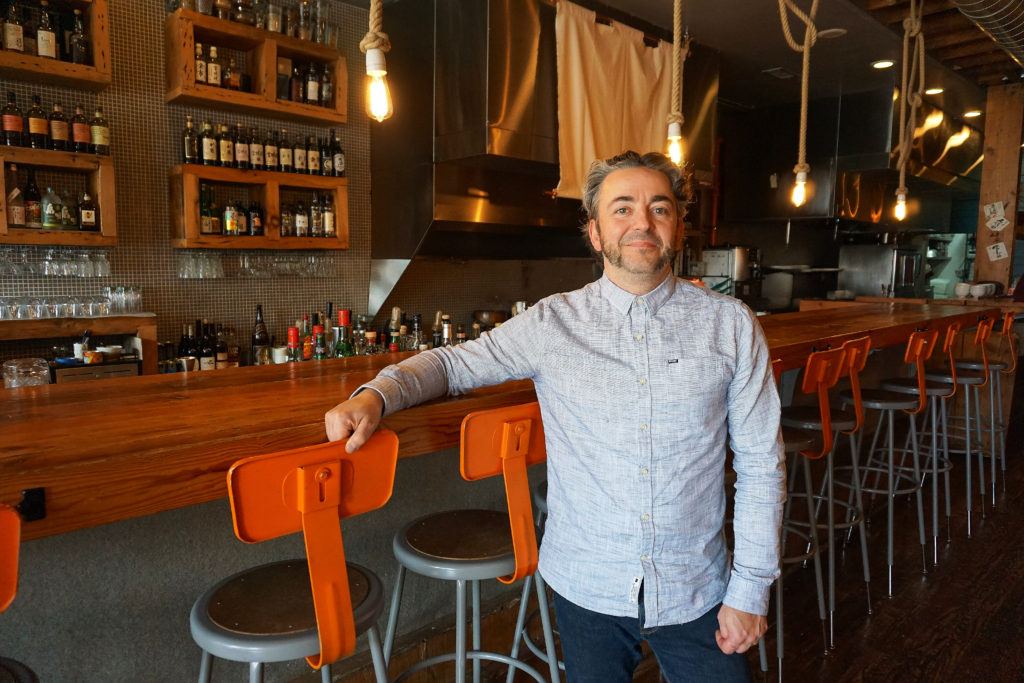
Matthias Merges at Yusho, a Japanese-themed restaurant and the flagship of his now-extensive Folkart Restaurant Management group. Merges will be one of the all-star chefs cooking at the Frontera 30th Anniversary Celebration fundraiser on April 30 at the Art Institute of Chicago. Photo: Bob Benenson/FamilyFarmed
Matthias: We were the first ones, at Trotter’s, to support the Cook County Jail non-violent felon farming program… [The officers] were all in their uniforms, and they came to the back door of Trotter’s when I was chef de cuisine there, and I’m like, “One of our guys is in trouble, they’re going to take him out.” It turned out he had four baskets, two of eggplant and two of broccoli, and he was like, “Hey, could you guys use something like this, we grow it at the jail, it helps the inmates.” And I said, “Of course, we’ll get it.”
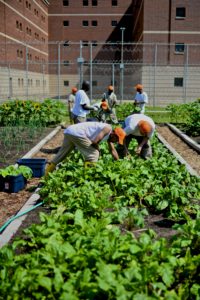
The Cook County Sheriff’s Garden Program in Chicago enables non-violent offenders to gain gardening and urban farming skills. Matthias Merges was the first to purchase produce from this valuable program when he was executive chef at the legendary Charlie Trotter’s and continues to do so in his own expanding restaurant group. Photo: Matthias Merges
And from that time on, we would buy everything that they grew, until it got to the point where, it was a very, very small plot they had. Now they have acres upon acres that they use, and we still use them to this day along with Planted, another urban farm [run by] Jen Rosenthal… (To read more about Planted Chicago on Good Food on Every Table, click here.)
It’s things like that and relationships that we’ve nurtured over the years that I think were very important to us and important to the community. People look toward that restaurant as the leaders of what happened. If you look towards Lee Jones in Ohio, we were the first ones to say, Lee, you might want to try growing this lettuce super-petite. That’s kind of the birth of microgreens and that was back in the ’80s. Just looking at those things and the progression of the understanding of what it means to buy local and what it means to support local farming, that really took off there…
FamilyFarmed: And then there’s the giving-something-back factor, such as the Cook County Jail project. Were you aware that there was this project?
Matthias: No. It was brand new, so they never talked about it… We were the first. It’s very important to me, I have three girls and we are really dedicated, we’re going to live in the city, we’re going to make a difference, we’re going to be involved not just in the restaurant business, but in our kids’ education…
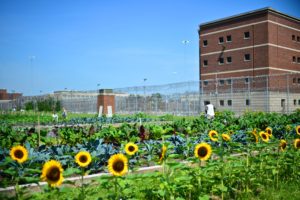
Photo: Matthias Merges
We founded Pilot Light Chefs, which is a 501(c)(3), and we go and create curriculum that is in line with the core curriculum in schools that teachers can use on an everyday basis that brings the language of food, well being, nutrition, into the classroom no matter what subject… (To read more about the Pilot Light program on Good Food on Every Table, click here.)
That’s my major focus, but we do the Cook County Jail, we’re heavily involved, we do Planted, we work with Gary Comer on the South Side. We try to fill our plate with good things to do.
FamilyFarmed: In terms of accelerating this movement, there’s nothing more important than working with our youngest eaters.
Matthias: Couldn’t agree more.
FamilyFarmed: Especially in terms of reconnecting people who live in communities that lack jobs and opportunities, and they’re trapped in this man-made environment. And to work with urban agriculture, school gardens, to enable them to establish that connection is just an amazing thing.
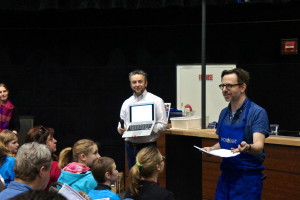
Top chefs Matthias Merges (left) and Jason Hammel conducted a demo of the innovative Pilot Light program at FamilyFarmed’s 2015 Good Food Festival. Both chefs are participating in the Frontera 30th Anniversary Celebration fundraiser. Photo: Bob Benenson/FamilyFarmed
Matthias: It’s a connection that’s been lost over a couple of generations… [Pilot Light is] in four schools on the South Side… we’re expanding into nine more schools. And when you get in front of these kids, and you have a red tomato and a yellow tomato, and they’re like, what is that yellow thing, they have never seen a yellow tomato, nor have some of the kids ever tasted a fresh tomato ever. Or they don’t know what a real live chicken looks like before it’s fabricated into chicken strips…
A couple of weeks ago we were in Englewood Montessori, we were doing a lesson plan on the preservation of foods, and we made kimchi with the kids, and they never had tried it. I brought in kimchi that we made and we brought in the Napa cabbage and chilis and salt and we were going to make our own kimchi. Every single kid tasted it, and then I left the jars of kimchi there for them to help turn and make sure the liquid is dispersed. The teacher said they were so into it, now they’re not afraid to try new things, they’re more open to suggestions of food and nutrition and health. Now we know we’re making some progress…
FamilyFarmed: I visited Pilot Light programs the past two years, and what was so impressive and encouraging was the degree of enthusiasm. These kids, from 1st grade on up, totally engaged.
Matthias: I think that for me food is a common denominator between all cultures, all the time… I realized food can create the situation between two kids of different cultures around food to understand empathy, to say, I know where that comes from, there’s a connection now.
FamilyFarmed: The concept of “breaking bread” goes back to the very earliest days of Western civilization.
Matthias: Exactly! Since bread was around, right?
FamilyFarmed: We’re planning on taking the Good Food is Good Medicine concept further. You spoke at the November event. How do we progress without getting pushback from people, without being too pushy, to say, there is a better way to eat…
Matthias: That’s a tough, very difficult thing to sell or push…
For me, what I hope we can provide is perspective. We’re not telling people and we’re not dictating, we’re providing perspective. Especially with children, we are trying to have children be comfortable with talking about food, talking about themselves and their health, not only with their own bodies, but their schools and their communities. Through that, we can create this slow-moving river of change, eventually.
One thing I don’t want to do is I never want to preach. That’s not our role…
FamilyFarmed: But the easiest part is just through programs like Pilot Light to introduce them to this food, and they taste it and they get the same epiphany that we all get. It may not be as accessible it needs to be for them, but I’ve heard stories of children who take that home and teach their parents.
Matthias: That’s exactly right. We’re about helping teachers teach and nurture children to gain a capacity for critical thinking, and these lesson plans help provide that. Once they have that base, they’re able to make great decisions.
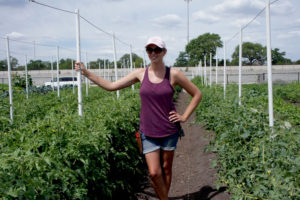
Urban farmer Jen Rosenthal’s Planted Chicago grows hyperlocal produce for Matthias Merges’ restaurant group at the Windy City Harvest program’s Legends farm in Chicago’s Bronzeville neighborhood. Photo: Bob Benenson/Family Farmed
FamilyFarmed: Let’s circle back around to your relationship with Planted and Jen Rosenthal. One of the most poignant things to me was when I learned that the Windy City Legends Farm is on the footprint of the former Robert Taylor Homes, that is very striking. [Note: The Robert Taylor Homes was a massive housing project on Chicago’s South Side that became so troubled-plagued that it was eventually torn down.]
Matthias: It makes a lot of sense when those things happen. For us, it’s about taking a vacant lot on 43rd Street and the [Dan Ryan] Expressway, and turning it into something that vibrant, that creates an economic value and also creates more of a green space within this dense urban landscape. There are many things that happen that are positive that are not just growing food to put on a plate at the restaurant. It’s much more than that.
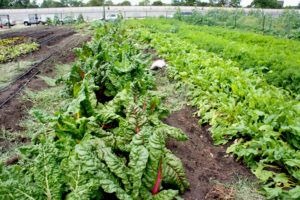
The rows of beautiful vegetables grown by Jen Rosenthal would fit in any rural field, but the urban setting is unmistakable. To the west are the Metra commuter tracks and, just beyond, the Dan Ryan Expressway. Photos: Bob Benenson/FamilyFarmed
FamilyFarmed: But the growing food and putting it on a plate in a restaurant is not inconsiderable. That only can be described as hyperlocal, especially since lacking refrigeration there, that get picked, it gets to you, and it’s probably on someone’s plate within a few hours.
Matthias: We just had a big all-restaurant meeting now and we were talking about the hyperlocal farming and we’re using Planted and Jen, we’re taking her whole plot, we’re using the Cook County Jail, we’re using Gary Comer, and we are planning to use those three farms at the height of the season to produce every vegetable we need for every property that we have.
Now we can say, This is truly local, it’s right down the street, you can go see it. It’s in the city, it’s creating jobs and economic value, it’s turning vacant land into something that is positive. It’s spreading the word, that’s very important. And I think a lot of chefs have started to realize that and they’re doing their own kind of things. And the more things like that, the more interesting things that can happen down the road.
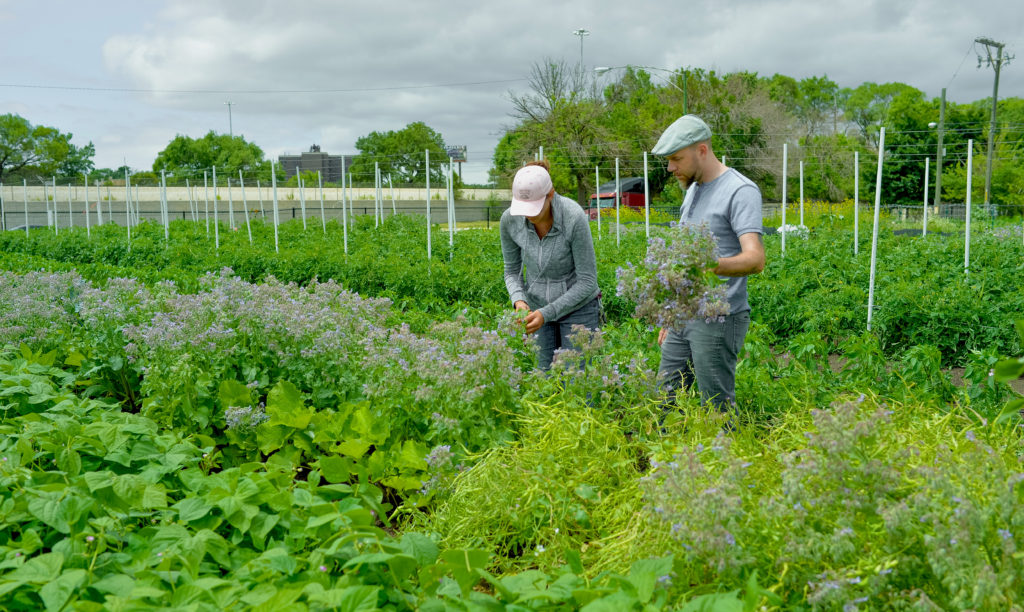
Staff from Matthias Merges’ Folkart Restaurant Managment group harvest food from Planted Chicago’s urban farm plot on Chicago’s South Side. Photo: Matthias Merges
